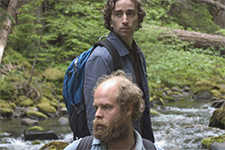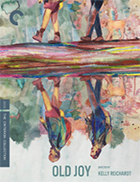Old Joy
|  In Kelly Reichardt’s Old Joy, two men who have been friends for a long time but whose lives are gradually taking them on different paths get together for a spontaneous two-day camping trip. Both men look to be in their mid-30s, and while they clearly have a great deal of shared history, it is also clear that they have not spent much time together in recent years and are therefore becoming strangers. The film, which Reichardt co-wrote with novelist Jonathan Raymond from one of Raymond’s short stories, is purposefully minimal in terms of plot and action, which encourages us to look deeper into the characters and focus on the small details that many films often gloss over or ignore. This is the strength of Reichardt’s art, and while it isn’t as emotionally gripping as her next film, Wendy and Lucy (2008), Old Joy hits on a lot of truth without ever feeling like it is exerting narrative muscle. It simply is, which is much harder to accomplish than it sounds. Mark (Daniel London), who is thin and passive and who we first see in his backyard trying and failing to meditate, is on the cusp of fatherhood and is dealing with all the mundane realities of having a pregnant wife (Tanya Smith), juggling jobs and schedules, and so on. Kurt (Will Oldham), on the other hand, who is shaggy and heavily bearded and lives a life of general abandon, is resistant to anything that might resemble “settling down.” He has a nomad’s life that gives him a great deal of personal freedom, but also leaves him rootless. Both men are seeking some kind of connection, some kind of grounding, some sense of purpose, and their brief time together hiking in the woods of the Pacific Northwest outside of Portland to get to a hot spring deep in the forest offers them an opportunity to reconnect on some level, although part of the film’s strength lies in its resistance to big revelations or major character turns. Life doesn’t work that way, and Reichardt is deeply committed to subtlety and ambiguity. We get the sense at the end of the film that things have changed as a result of their time together, but she refuses to clarify exactly what that is. Rather, she leaves it for us to ponder. London and Oldham are both astutely cast as Mark and Kurt, and they have a chemistry that suggests both the inherent awkwardness of friends being together who used to know each other much better than they do now and the permanence of their history, however strained it has become in the moment. They share old stories and remind each other of things that the other has forgotten; Kurt smokes a lot of weed and they shoot pellet guns at beer cans by a campfire and eventually find their way to the hot spring, where they spend much of a day soaking in tubs carved from giant logs filled with near-scalding spring water. At the end of the sequence at the hot spring, there is a moment that I’d rather not try to describe except to say that it is a masterful bit of ambiguity—a weirdly tense exchange between the two men that could, at any point, have logically become either highly erotic or violent, but is ultimately neither. During that same sequence Kurt delivers a long speech about a personal experience and dream he had, and while there are suggestions of epiphany, it doesn’t come out directly or explicitly. Much of the dialogue is simply functional—the way people talk in real life—but there are brief moments of either sudden emotional nakedness, such as when Kurt blurts out how much he misses their friendship, or poetic reflection, as when he tells Mark that a woman in a dream told him that “sorrow is just worn-out joy.” Old Joy was made on a shoestring, cobbled together by a tiny but committed film crew who had no idea that the film would turn into something of an indie sensation, launching Reichardt’s career (she had previously made only one feature more than a decade earlier, 1994’s River of Grass). Reichardt and cinematographer Peter Sillen capture the beauty of the Pacific Northwest in all its raw intensity (the use of Super 16mm actually aides in the conveying in the intensity of the environment). And, while some of the travelling shots feel like filler to get the film to feature length (it clocks in at only 73 minutes), most of the film feels just right in the way it evokes the simple truths about human connection and disconnect and everything in between.
Copyright © 2020 James Kendrick Thoughts? E-mail James Kendrick All images copyright © The Criterion Collection | |||||||||||||||||||||||||||||||
Overall Rating: 

 (3)
(3)


